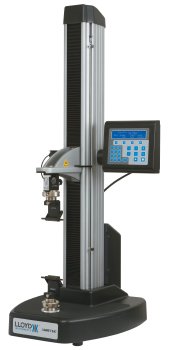Lloyd Instruments, a leading manufacturer of materials testing machines, announces a new, high precision universal materials testing machine for testing at forces up to 5 kN/1124 lbf.
The new, single column LS5 enjoys the same mechanical design principles introduced on the LS1 instrument, with linear guide technology, pre-loaded ball screws and advanced software compensation to ensure high displacement precision.
 The new, single column LS5 high precision universal materials testing machine from Lloyd Instruments.
The new, single column LS5 high precision universal materials testing machine from Lloyd Instruments.
A wide speed range (0.01-1016 mm/min (0.0004-40 in/min)), exceptional load accuracy (±0.5% down to 1% of load cell value), a choice of 8 plug'n'play YLC Series load cells with different load ratings and resolution and a large work area (150 mm throat depth) combine to ensure high quality results and high productivity. The LS5 has applications in a host of industries ranging from medical devices, plastics and packaging to textiles, rubber, electronics and more. Equally suited to quality control, educational and R&D environments, the new LS5 offers extraordinary versatility, with its extensive range of grips, fixtures and extensometers and scalable operation from stand-alone to PC control.
The LS5 is capable of performing a wide range of tests, including tensile, compression, flexural, friction, insertion/extraction, peeling, tearing and creep/relaxation, meeting or exceeding national and international material test standards. Simple operation, from the intuitive stand-alone user interface to Lloyd Instruments' well-respected NEXYGENPlus materials testing software used in PC-controlled versions, makes the LS5 a popular addition to any laboratory or production line.
NEXYGENPlus materials testing software allows the operator to control and monitor all aspects of a PC-controlled LS5 from a single front end, ensuring fast, reliable and powerful testing and data analysis. Interfacing to the LS5 via USB allows standard laptops to be used. The Windows7-compatible NEXYGENPlus software features a new and improved User Configurable Test functionality enabling users to quickly build advanced multi-stage test routines using simple built-in commands. This complements the comprehensive built-in library of test methods meeting international test standards.
NEXYGENPlus can also be used to integrate the LS5 with other systems to accommodate the increasing use of automation in manufacturing. Applications include: automated sample handling, in-line testing and monitoring of parameters from other sensors such as thermocouples and strain gauges.